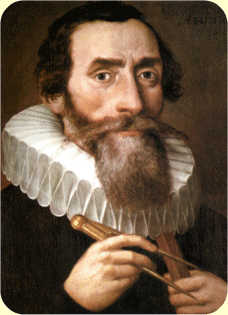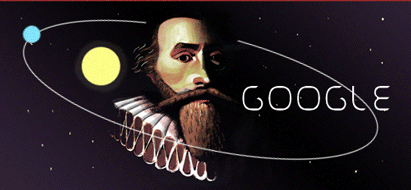 Johannes Kepler (27 Dec 1571 - 1630) was an astrologer, astronomer and mathematician. Historian, John North claims 'had he not been an astrologer he would very probably have failed to produce his planetary astronomy in the form that we have it.'[1] However, Kepler's views on astrology were ambivalent. Johannes Kepler (27 Dec 1571 - 1630) was an astrologer, astronomer and mathematician. Historian, John North claims 'had he not been an astrologer he would very probably have failed to produce his planetary astronomy in the form that we have it.'[1] However, Kepler's views on astrology were ambivalent.
Kepler earned a living reading horoscopes for the rich and powerful, produced Yearly Almanacs with astrological and other phenomena, introduced three new aspects[2] to astrology and connected the tidal cycle with the Lunar Nodes[3]. In 1601, he wrote De Fundamentis Astrologiae Certoribus in which he "defends on physical grounds concerning the foundations of astrology ... "
Yet, Kepler was also critical of astrologers at a time when judicial astrology appeared to be no more than fortune-telling in an increasingly rational academic world. He described himself to his mentor, Michael Maestlin as a 'Lutheran Astrologer'[4] and claimed that 'Many of the rules of this Arabic art amount to nothing'. In line with the changing times, he wanted a reformation of astrology but, he implored theologians, physicians and philosophers not to 'throw the baby out with the bathwater'. [Tertium Intervens, 1610]
In 1606, Kepler wrote to Oxford scientist, Thomas Harriot:
"I am informed that misfortune came to you from astrology. I ask you if you believe that it could be powerful enough to have such power. Ten years ago, I rejected the division into 12 equal signs, the Houses, dominations (i.e. rulerships), triplicities etc. and I am retaining only the aspects (angles) and am transferring astrology to the science of harmonics."
On the face of it, these widely quoted comments promote a popular myth that Kepler did not 'believe in astrology' and sought to destroy the 'superstition' but had to practice astrology simply to pay the bills. However, Kepler's public comments may not have been a genuine reflection of his personal view of astrology:
-
Kepler was seeking information from Harriot on his experiments in refraction. He was also aware of Harriot's criticism of astrology and was clearly attempting to recast astrology within what he thought might be a more acceptable Harmonic-Pythagorean framework.[5]
- Though Kepler expressed concern to Michael Maestlin that his work on Alamanacks would harm his scientific reputation, Kepler continued to publish these astrological predictions up until 1624. He was not averse to using signs in his analyses. In his prognostication for the Winter of 1618 - Kepler writes ".... that it may be rain or snow. The causes being Venus and Mercury in Sagittarius ..."[6.1]
- In 1603, Kepler saw significance in the Jupiter/Saturn conjunction falling in a different element. This confirms that he had not abandoned the triplicitities (and hence the associated zodiacal signs) in the previous century as he had claimed.[6.2]
- In Kepler's re-analysis and rectification of the chart for Albrecht Wallenstein, a Bohemian General, on 21 January, 1625 Kepler refers to the Moon in 12th house and Venus square the ascendant.[6.3] In 1999, an astronomer found a horoscope drawn up by Kepler.[7] It clearly shows the positions of the houses and the signs. It was for an Austrian nobleman who was born in 1587. Kepler's client would have had to have been less than 10 years old and Kepler 25, for his claim to Harriot to be true.
- After the death of his son in 1611, Kepler corresponded with Michael Maestlin at the University of Tübingen. In two private letters, Kepler discussed the horoscopes of his family and the astrological reasons for his son's death.[8] This private exchange, where no financial gain was involved, reveals that Kepler's interest in astrology was unquestionably sincere.
So Kepler's interest in astrology was sincere and he did not practice it merely to pay his bills. He was however concerned about his reputation in an age of rationalism and positioned himself as a sceptical astrologer. However, despite claims to have rejected astrological techniques other than aspects, he continued to refer to planets in houses and signs in a way that implies significance beyond mere location.
The parts of astrology which Kepler claimed to reject (Signs, Rulerships etc) were later reinterpreted following the discoveries of the outer planets from 1781 onwards.[9] In many ways, Kepler was no different from many professional astrologers today who don't accept all the theories and disapprove of attention-grabbing and crowd-pleasing [10] astrology, which nowadays takes the form of Sun-sign columns in the media and question whether astrology is more about coinciding events rather than causal effects.
Robert Currey
Reference:
Kollerstrom,Nick Kepler's Belief in Astrology ~
Greenbaum,D.G.; Linde, J.C. & Boner, P. (2010) Kepler's Astrology Culture and Cosmos Vol 14 1&2.
Footnotes
www.twitter.com/RobertCurrey
 Share Share
|
 |
Astrology is often judged on the basis of a 'secondary or tertiary' opinion such as a teacher or a text book. What students or readers don't know is that this apparent 'authority' lacks the expertise on the subject and often uncritically recycles a mix of prejudice or hearsay. This is most evident when 'scholars' try to rewrite history to impress students that they are supported by the opinions of great scholars such as Cicero, Newton, Liebniz or Einstein. So biographies are often framed so that they appear to favour the author's world view.
While it is important to establish historical truth and gratifying to find that astrology occupied so many geniuses in the arts, culture and science, their opinions have little or no bearing on the veracity of astrology. Science and astrology has advanced (with new planets, techniques and evidence) in the years after their lifetime.
Here we challenge the assertion that Kepler only practiced astrology to pay the bills.
'The soul of the newly born baby is marked for life by the pattern of the stars at the moment it comes into the world, unconsciously remembers it, and remains sensitive to the return of configurations of a similar kind.'
Kepler, Harmonics Mundi, chapter 7
 Google Doodle to celebrate Kepler's 442nd birthday. Google Doodle to celebrate Kepler's 442nd birthday.
 |
 Main Astrology News Page. Information, stories, theories and facts. Main Astrology News Page. Information, stories, theories and facts.
 Index to past articles Over 50 articles relating to astrology.
Index to past articles Over 50 articles relating to astrology.
 | Why it is no longer acceptable to say astrology is rubbish on a scientific basis. |
 | Philosophers who refused to look through Galileo's Telescope |
 | Problems with testing astrological practice under strict scientific conditions |
 | Was CSICOP scientific and is CSI truly skeptical?
|
 | How Wikipedia has been hijacked by 'guerrilla skeptics' who push an anti-astrology agenda. |
 | Illusionists are for entertainment, not to feign or undermine science. |
 | U-Turn in Carlson's Double-Blind Astrology Experiment |
 | How and why Astrology became an outcast from the mainstream |
 | Scepticism can be used to justify institutional bias even among respected scientists and journals. |
 | Sunday Times article on Percy Seymour's new Book Scientific Proof of Astrology |
 | Is there a known mechanism for astrology and if not can it be dismissed? |
 | Was astronomer and mathematician, Johannes Kepler a sceptic or an astrologer or both? |
 Horoscope drawn up by Johannes Kepler. Horoscope drawn up by Johannes Kepler.
|
 Johannes Kepler (27 Dec 1571 - 1630) was an astrologer, astronomer and mathematician. Historian, John North claims 'had he not been an astrologer he would very probably have failed to produce his planetary astronomy in the form that we have it.'[1] However, Kepler's views on astrology were ambivalent.
Johannes Kepler (27 Dec 1571 - 1630) was an astrologer, astronomer and mathematician. Historian, John North claims 'had he not been an astrologer he would very probably have failed to produce his planetary astronomy in the form that we have it.'[1] However, Kepler's views on astrology were ambivalent.  Google Doodle to celebrate Kepler's 442nd birthday.
Google Doodle to celebrate Kepler's 442nd birthday. Main Astrology News Page. Information, stories, theories and facts.
Main Astrology News Page. Information, stories, theories and facts.  Index to past articles Over 50 articles relating to astrology.
Index to past articles Over 50 articles relating to astrology. Horoscope drawn up by Johannes Kepler.
Horoscope drawn up by Johannes Kepler.